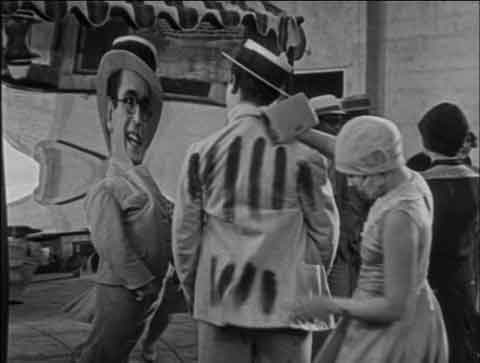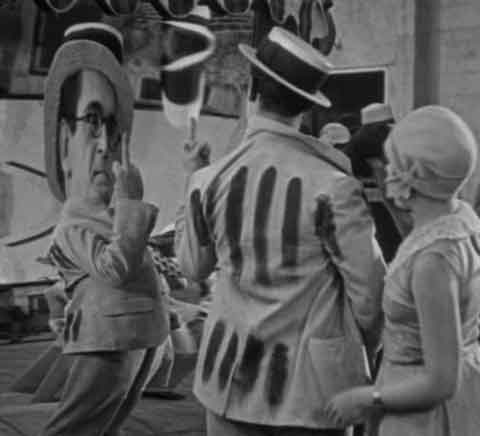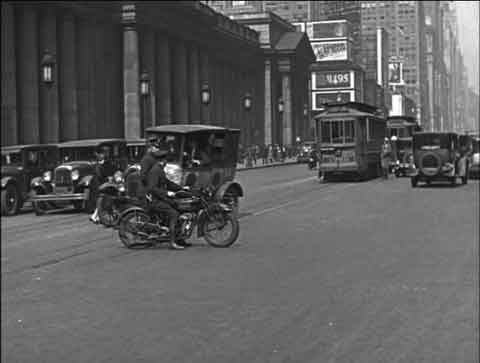
Ho ho! Gazebo bleat. It’s Sunday afternoon, and it’s 57 degrees. I probably won’t have much time to write tonight, since I have to MC the MYS concert tonight. It’s an evening show this time, and I have a co-host: Miss Minnesota. We’re supposed to banter between the various performances. This should be . . . interesting. What do you say, banter-wise, to a beauty queen? Without getting into beauty-queen territory, that is; it seems somehow off limits, as well as irrelevant to the concert. But she’s a former Minnesota Youth Symphony member, so I suppose we can talk about that. So! Played the Viola, eh? Which was your favorite string?
Ran errands Saturday afternoon with the Giant Swede, who was wearing a cap and small shades and looked like nine feet of ATF agent. We ended up at the coffee shop in strip mall, down from the Shinder’s magazine store. They have tables outside in the warmer times. The tables were gone. They’d been gone for weeks, I guess. But the temps were high – low fifties – so we got our coffee and sat on a bench facing the parking lot. I broke out the small cigars. One of those moments where you have a very clear vision of yourselves in a quarter century with white hair coming out of your ears, sitting on a park bench, hawking up throat spackle, dealing grief to the other for something that goes back 30 years, judging the passing cars, falling silent when an attractive woman jounces past, looking up at the sky and soaking in whatever sun you can get.
This time of year, he said, it gets me.
Feels like morning in Arizona in the depths of January, I said. I like it.
Yeah, well, it’s not the temperature. It’s not even the trees. He gestured at the thin empty trees planted in the sidewalk. It’s the light. It’s the angle of the light.
He was right, of course; it was three o’clock, and the sun was low, the shadows long. It gives you the feeling that it’s too late to go. The last train has left Paris; tomorrow morning the Nazis parade down the Champs Elysee.
Speaking of which: I was 25 when I first saw “Casablanca,” an almost fatal age at which to absorb those lessons for the first time. A man shall wear a white coat and regard everyone with affectionate disdain; a man shall smoke at all times, excepting the moments when he is operating a firearm – only bad men smoke and shoot; a man shall react to the physical manifestation of lost love by drinking himself into a muttering stupor; a man shall own a nightclub; a man shall hate Nazis; a man shall have an indistinct past laced with intimations of idealism but tempered with cynical realism; and – this is key – a man, when holding a beautiful woman in a Parisian garret, shall note the approaching artillery and comment on the particular size of the gun based on its auditory profile, and do so without fear or concern. Later, the man shall have the skill to secure passage on the last train out. But only after the champagne’s run out. To leave behind the Moet would be barbaric.
We all knew these things to be true. But all our times provided was the chance to drink and smoke.
The movie options were slim, so I went back to the silent films. Got out the Harold Lloyd collection, and watched “Speedy” – it’s a perfect introduction to Lloyd, and reminds me why this guy was so incredibly popular. There’s an American quality to his character and his work, and the difference between his films and Chaplin is quite striking when you think about it. America was a set for Chaplin; it was home for Lloyd. “Speedy” is shot mostly in Manhattan, and also serves as an accidental documentary for 1928. The city looks as crowded and busy as it does today – more so, in a way, since every street had trolleys and trucks and cars moving in opposite directions against cross-at-will crowds who mill around the streets by the million. It looks messier and dirtier and chaotic but incredibly alive.
A lengthy sequence at Coney Island is so vibrant and engrossing you almost forget to watch the gags – you’re too busy studying the rides and Midway sideshows that cram every frame. And it’s all gone, of course, which gives it that home-movie-from-Pompeii feel. The running gag in the Coney sequence concerns Harold’s new coat, which he wants to keep clean for a new job. Of course, it gets filthy – dog paws, mustard, ink, and finally paint from a picket fence. He sees himself in front of a funhouse mirror, notes the damage, but in true Lloyd style makes his peace with the disaster and grins it off:

Then he tells his reflection exactly how he feels about the trials he has visited on his suit:

1928. The commentary track noted that the Hays Office didn’t notice, or let that one slide, and speculated that Lloyd’s friendship with Will Hays might have played a part. More likely was the fact that the Hays Office production code wasn’t adopted until 1930. The comment was typical of the track, unfortunately. Here’s a shot of Penn Station:

And here’s the commentary track observation. (wav file)
Well, no. The commentary is otherwise enjoyable, and points out all the various people who played bit parts – when one old fellow volunteers to help Harold fight the toughs, he says he was a Civil War vet – and by jiminey, he was. The world of 1928 isn’t entirely unfamiliar to our eyes; they had phones and planes and movies and mass culture and 60-story buildings. But in all that rush, all that modernity, you could still find an old man down the hall who heard Lincoln speak.
Post-show roundup: it was a snap. As expected, I came up to Miss Minnesota’s sternum. When the applause died down after I introduced her, I thought: a lesser man would milk this moment and stand on tip-toes. Luckily, I am that lesser man. Even better: there was a riser behind me for the harp; after a few seconds I got up on it. Got the evening off to a nice start, I think. It was one of the better performaces all around – the Symphony Orchestra, being the high-school set, did the first movement of Mahler’s 3rd, and it was remarkable. That’s a big beast to move around. But the brass were punchy and almost frack-free; not once did I hear that signature trumpet motif essayed with anything but clarity, and the woodwinds were appropriately grotesque and Mahleresque. Something else. At the end, after all the bows, Manny (the conductor) held the score aloft to the audience, and the shade of Gustav Mahler got his due.
Shade? He’s been dead ninety-some years, but gets reanimated somewhere every time someone drops the needle or picks up the baton.
Anyway, it was a fine start to the season. At least I knew I could flub my lines or walk out with my shirttail hanging out of my fly: no one was paying me any heed.
New Match; the calendar for last month is finally fixed. Thanks for coming, and I’ll see you tomorrow.
|
|
|
|
|
|
|
|
|
|
|
| Su |
M |
T |
W |
Th |
F |
S |
|
|
|
|
|
|
4 |
5 |
|
|
|
|
|
11 |
12 |
|
|
|
|
|
18 |
19 |
|
|
|
|
|
25 |
26 |
|
|
|
|
|
|
|
|
|
|
|
|
|
| |
|
<< |
|
>> |
|
|
|
|
|
|
|
 |
|
|
|
|
|
|
|
| |
|
|
| |
|
|
|